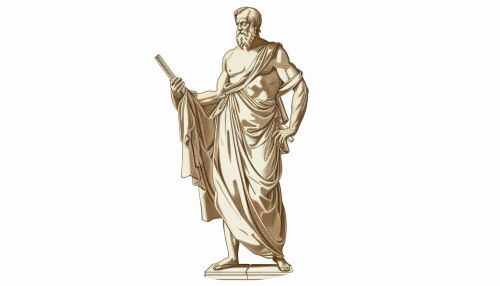Thales: Difference between revisions
(Created page with "== Early Life and Background == Thales of Miletus, often referred to simply as Thales, was a pre-Socratic Greek philosopher, mathematician, and astronomer from Miletus in Ionia, Asia Minor (modern-day Turkey). He is regarded as one of the Seven Sages of Greece and is often considered the first philosopher in the Western tradition. Thales was born around 624 BCE and died around 546 BCE. His work laid the foundation for many aspects of Western philosophy and science. ==...") |
No edit summary |
||
| Line 26: | Line 26: | ||
Thales is also reputed to have used geometry to solve practical problems, such as calculating the height of pyramids and the distance of ships from the shore. His methods involved using similar triangles and the properties of circles, demonstrating an early use of deductive reasoning in mathematics. | Thales is also reputed to have used geometry to solve practical problems, such as calculating the height of pyramids and the distance of ships from the shore. His methods involved using similar triangles and the properties of circles, demonstrating an early use of deductive reasoning in mathematics. | ||
[[Image:Detail-79327.jpg|thumb|center|Ancient Greek philosopher Thales depicted in a classical style, standing and holding a scroll.|class=only_on_mobile]] | |||
[[Image:Detail-79328.jpg|thumb|center|Ancient Greek philosopher Thales depicted in a classical style, standing and holding a scroll.|class=only_on_desktop]] | |||
== Astronomical Contributions == | == Astronomical Contributions == | ||
Latest revision as of 02:33, 18 May 2024
Early Life and Background
Thales of Miletus, often referred to simply as Thales, was a pre-Socratic Greek philosopher, mathematician, and astronomer from Miletus in Ionia, Asia Minor (modern-day Turkey). He is regarded as one of the Seven Sages of Greece and is often considered the first philosopher in the Western tradition. Thales was born around 624 BCE and died around 546 BCE. His work laid the foundation for many aspects of Western philosophy and science.
Philosophical Contributions
Thales is best known for his belief that water is the fundamental substance (archê) from which everything else originates. This idea is one of the earliest recorded instances of a philosopher seeking a naturalistic explanation for the cosmos, as opposed to mythological explanations. Thales' assertion that water is the primary substance can be seen as an early form of monistic thought, where a single element is considered the basis of all reality.
Cosmology
Thales proposed that the Earth floats on water and that earthquakes occur when the Earth is disturbed by waves. This hypothesis reflects his broader belief in the importance of water as the essential element. Thales' cosmological views were revolutionary because they sought to explain natural phenomena through natural causes, laying the groundwork for subsequent scientific inquiry.
Metaphysics
In metaphysics, Thales is credited with the idea that all things are full of gods, suggesting a form of panpsychism where even inanimate objects possess a form of life or soul. This perspective challenges the strict separation between animate and inanimate, suggesting a more interconnected and dynamic universe.
Mathematical Contributions
Thales made significant contributions to mathematics, particularly in geometry. He is often credited with several geometric principles, some of which are known as Thales' Theorems. These include:
- A circle is bisected by its diameter.
- The base angles of an isosceles triangle are equal.
- The angles between two intersecting lines are equal.
- An angle inscribed in a semicircle is a right angle.
Thales is also reputed to have used geometry to solve practical problems, such as calculating the height of pyramids and the distance of ships from the shore. His methods involved using similar triangles and the properties of circles, demonstrating an early use of deductive reasoning in mathematics.


Astronomical Contributions
Thales is credited with several important contributions to astronomy. He is said to have predicted a solar eclipse that occurred on May 28, 585 BCE, an event that was considered a remarkable achievement in ancient times. This prediction demonstrated an understanding of the cycles of celestial bodies and suggested that such events could be anticipated through careful observation and calculation.
Thales also studied the stars and is believed to have introduced the concept of the celestial sphere, a model that imagines the stars as fixed points on a sphere surrounding the Earth. This model was influential in the development of later astronomical theories.
Influence and Legacy
Thales' work had a profound impact on subsequent philosophers and scientists. His emphasis on naturalistic explanations and his use of logical reasoning set a precedent for future inquiry in both philosophy and science. Thales' ideas influenced his immediate successors, such as Anaximander and Anaximenes, who further developed his concepts.
Influence on Philosophy
Thales is often regarded as the first philosopher in the Western tradition because he sought to explain the natural world without resorting to mythology. His approach laid the groundwork for the development of natural philosophy, which eventually evolved into modern science. Thales' emphasis on rationality and observation influenced later philosophers, including Pythagoras, Heraclitus, and Parmenides.
Influence on Mathematics
Thales' contributions to geometry were foundational for the development of Greek mathematics. His use of deductive reasoning and his formulation of geometric principles influenced later mathematicians, such as Euclid, who built upon Thales' work in his seminal text, "Elements." Thales' methods also laid the groundwork for the development of trigonometry and other branches of mathematics.
